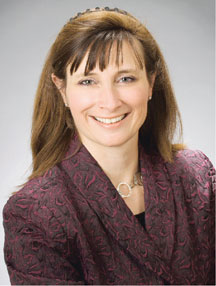 What is Jewish leadership? How does a community inspire its members to become strong leaders? These are questions that Erica Brown, Ph.D. has been helping communities deal with for years. The Jewish Federation of Greater Kansas City is bringing her to the area May 8-9 to help guide the community in the area of leadership.
What is Jewish leadership? How does a community inspire its members to become strong leaders? These are questions that Erica Brown, Ph.D. has been helping communities deal with for years. The Jewish Federation of Greater Kansas City is bringing her to the area May 8-9 to help guide the community in the area of leadership.
The scholar in residence at the Jewish Federation of Greater Washington, Dr. Brown consults with many Jewish non-profits to help their leaders evolve. She became interested in Jewish leadership issues while working in her first job at the Combined Jewish Philanthropies in Boston.
“I was struck by how many leadership programs we have in the Federation system but how few genuinely focus on leadership development, in terms of helping people with basic leadership skills like public speaking and running meetings but also larger conceptual issues like change and transformation,” she said.
The topic of transformation is an issue Dr. Brown will focus on as the keynote speaker at Women’s Philanthropy’s annual meeting, scheduled to be held at 7 p.m. May 8 at the Jewish Community Campus. Dr. Brown’s topic will be “From Inspiration to Transformation.” Transformations is an important topic to Women’s Philanthropy, which recently changed its name from Women’s Division to more closely align with the other Jewish Federations across the nation.
Dr. Brown says as she discusses transformation, she will “address issues of change and resistance and how people can be genuinely inspired to change and reinvigorate Federation to help it catch up to trends in philanthropy without losing its essential mission: to build community through tzedakah.”
“I also want to address how we can nurture women’s leadership in a classically male-dominated system,” she continued.
The author of many books including “Inspired Jewish Leadership: Practical Approaches to Building Strong Communities,” Dr. Brown said that Jewish leadership is not really different from any other kind of leadership.
“I think it is merely inspired from a different place,” she said.
“When you inherit a tradition that is over 4,000 years old, you realize that you are part of something horizontal, that touches those around you, and vertical, that you inherit from the past and give to the future. You have to take very good care to pass it on from generation to generation because our very existence is a miracle. Our leaders, in that sense, need to be miracle makers, or at very least, those who can inspire others to be part of this long tradition.”
As the discussion leader at an interactive breakfast workshop on May 9, when she speaks about “Innovation and Change: The Key to Our Future,” Dr. Brown will focus on this need to inspire others. She will talk about “innovation and whether or not we are truly ready to do things differently.”
“I am not a lecturer in the classic sense. Everything I do in teaching is interactive. I want to stimulate a robust conversation about innovation,” she continued.
“Leadership takes inner work,” she explained. “It is not about hearing a consultant entertain you. It is about strategic thinking, vision, taking people out of their comfort zone to go somewhere they were not previously prepared to go. This involves risk. Well-established systems are often averse to risk. I don’t think we need to change everything but we do need to create more fertile ground to discuss change.”
Dr. Brown believes it is important to have our young people become good leaders. She said we need to “teach children at an early age to become comfortable writing and addressing others publicly and help mentor them and seek out positions for them in our community to grow their leadership.”
“As the saying goes: what we pay attention to grows. We have to find ways to grow young people,” she said.
An important part of her message is to allow people to be leaders. She also pointed out that is extremely important in the Jewish community if we do not want to lose leaders. In her book about Jewish leadership, she writes of young Jewish professionals who leave the Jewish non-profits to work at other organizations.
“If we want a truly professional staff, we have to treat them as the professionals they are,” Dr. Brown said.
“We have people in the Jewish non-profit world today who are more educated and better qualified to do their jobs than at any point in Jewish history. At the same time, we dis-empower them by not allowing them to determine directions and use their skills and background to enhance our community. It irks me to see a boardroom where professionals sit behind board members and not at the table. The lay/professional relationship has to be seriously rethought and reconstructed to maintain the dignity of both sides.”
Dr. Brown’s focus on leadership is ongoing because she wants the Jewish community to continue to thrive. She is concerned about how the Jewish community is losing leaders and donors. But she sees this as a chance for change to make it better.
“Our federation system has as a whole lost half the number of its donors in the past decades,” she said. “Anyone seeing the big picture understands that hundred-year-old organizations cannot do business as usual to have influence and impact. That is a frightening proposition but we also have to see it as a thrilling opportunity.”
For more information about these programs, call the Federation at 913-327-8100.



